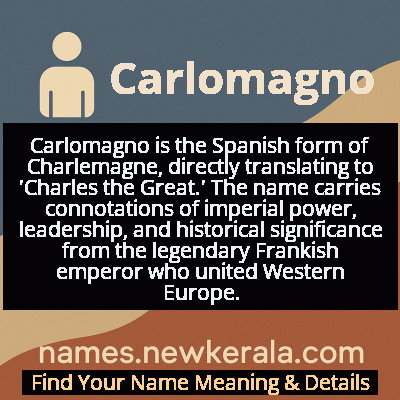Carlomagno Name Meaning & Details
Origin, Popularity, Numerology Analysis & Name Meaning of Carlomagno
Discover the origin, meaning, and cultural significance of the name CARLOMAGNO. Delve into its historical roots and explore the lasting impact it has had on communities and traditions.
Name
Carlomagno
Gender
Male
Origin
Spanish
Lucky Number
9
Meaning of the Name - Carlomagno
Carlomagno is the Spanish form of Charlemagne, directly translating to 'Charles the Great.' The name carries connotations of imperial power, leadership, and historical significance from the legendary Frankish emperor who united Western Europe.
Carlomagno - Complete Numerology Analysis
Your Numerology Number
Based on Pythagorean Numerology System
Ruling Planet
Mars
Positive Nature
Generous, passionate, energetic, and humanitarian.
Negative Traits
Impulsive, impatient, moody, and can be overly emotional.
Lucky Colours
Red, maroon, scarlet.
Lucky Days
Tuesday.
Lucky Stones
Red coral, garnet.
Harmony Numbers
1, 2, 3, 6.
Best Suited Professions
Military, sports, philanthropy, leadership roles.
What People Like About You
Courage, energy, leadership, generosity.
Famous People Named Carlomagno
Carlomagno
Historical Figure
United Western Europe and established the Carolingian Empire
Carlomagno Rodríguez
Baseball Player
Played as outfielder for Pittsburgh Pirates in Major League Baseball
Carlomagno Pedroza
Musician
Renowned percussionist blending traditional Venezuelan music with contemporary styles
Name Variations & International Equivalents
Click on blue names to explore their detailed meanings. Gray names with will be available soon.
Cultural & Historical Significance
The cultural impact extends beyond historical records into mythology and national identity formation. In Spanish-speaking regions, particularly those with strong Catholic traditions, Carlomagno symbolizes the defense of Christendom and the establishment of lawful, enlightened governance. His legendary status grew through centuries of storytelling, where he became an almost mythical figure representing the pinnacle of medieval kingship. The name continues to evoke images of courtly culture, chivalric ideals, and the transmission of classical knowledge through monastic and scholarly networks he established across his empire.
Extended Personality Analysis
Individuals bearing the name Carlomagno are typically associated with strong leadership qualities, strategic vision, and natural authority. They often exhibit a commanding presence combined with intellectual depth, reflecting the historical figure's reputation as both a warrior and patron of learning. These individuals tend to be ambitious yet practical, capable of both grand vision and meticulous organization. They often demonstrate loyalty to their principles and expect the same from others, creating strong bonds based on mutual respect and shared purpose. Their personality typically blends traditional values with progressive thinking, making them effective at managing complex systems and diverse groups of people.
Beyond leadership qualities, those named Carlomagno often show cultural sophistication and appreciation for arts and education. They tend to be protective of their communities or organizations, showing concern for both immediate needs and long-term development. Their decision-making style typically balances intuition with careful analysis, and they're often respected for their fairness and consistency. While they can be demanding in their standards, they usually lead by example and invest in developing those around them. The weight of their historical namesake often inspires them to pursue significant achievements and leave lasting positive impacts in their chosen fields.
Modern Usage & Popularity
In contemporary naming practices, Carlomagno maintains a distinctive presence as a powerful historical name that conveys strength, leadership, and cultural heritage. While never achieving widespread popularity, it enjoys consistent usage particularly in Venezuela, Colombia, and other Latin American countries where historical European names remain valued. The name is typically chosen by educated families with strong interest in history, literature, or Catholic traditions. Recent decades have seen modest increases in usage as part of broader trends toward unique, meaningful names that stand out from more common choices. It's particularly favored in academic, artistic, and professional families who appreciate its imperial connotations and literary associations. The name's rarity ensures that bearers receive individual attention while its historical weight provides built-in respect and expectation of character.
Symbolic & Spiritual Meanings
Carlomagno symbolizes the unification of diverse elements into a coherent, civilized whole—much like the historical emperor who blended Roman administration, Christian morality, and Germanic warrior culture into a new European identity. The name represents the ideal of enlightened leadership that combines military strength with cultural and educational advancement. Symbolically, it suggests someone destined to build institutions, preserve knowledge, and protect communities while expanding horizons. It carries connotations of imperial responsibility, where power is exercised not for personal glory but for the betterment of society. The name also embodies the concept of cultural transmission and renaissance, representing the preservation and enhancement of tradition while embracing innovation and progress. In psychological terms, it symbolizes the integration of authority with wisdom, strength with compassion, and tradition with vision.

